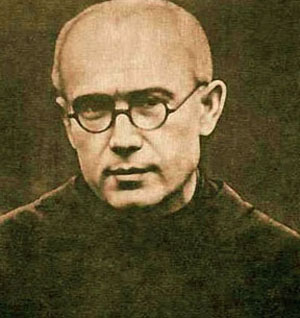No one has greater love than this, to lay down one's life for one's friends" John 15:13.
The best modern-day example of submission to this noble ideal is Maximilian Kolbe. Although he is chiefly known for the manner of his death, his life is also interesting.
He was born Raymond Kolbe, in 1894, near Lodz, Poland, when that country was still a part of the Russian Empire. His parents were poor basket weavers. His father was captured and hanged in 1914 for activities considered traitorous to Russia.
Raymond and his brother Francis joined the Franciscan Friars in 1907. He adopted the names Maximilian Maria, because of his great devotion to the Blessed Virgin Mary. He took his final vows as a Franciscan monk in 1914, in Rome, where he had been sent to study. While in Rome, he earned doctorates in Philosophy and Theology and in 1918 he was ordained a priest of the Roman Catholic Church.
In 1919, Maximilian returned to a newly-independent Poland. He founded and supervised a monastery near Warsaw, a seminary, and a radio station. He printed eleven periodicals, (one with the circulation of over a million copies) and a daily newspaper. In all his endeavors, he tried to promote veneration to the Blessed Virgin Mary.
Between 1930 and 1936, Father Kolbe undertook missions to Japan and India. He founded friaries in both countries. In 1936, he was recalled to supervise the original friary near Warsaw. When Germany invaded Poland in 1939, he and the other friars sheltered 3000 Poles and 1500 Jews, and prevented them from being captured by the enemy. The monestery continued to publish the newspaper and broadcast radio programs as long as possible encouraging the Polish people to resist the Nazi invaders.
In 1941, Maximilian Kolbe was arrested by the German Gestapo and was eventually transferred to the prison at Auschwitz, where he carried on ministering to his fellow prisoners in secret. He heard Confessions in unlikely places, and celebrated Mass with bread and wine which had been smuggled into the camp.
In order to discourage attempts to escape, the prison had a rule that for every escapee, ten other men would be put to death. In July of 1941, a man from Kolbe's bunker disappeared. Ten men were chosen to be starved to death. One of those chosen, Franciszek Gajowniczek, was especially upset because he had a wife and family, and he had hoped to return to them someday. Father Kolbe volunteered to take his place. His offer was accepted.
In the death cell, Maximillian encouraged the nine others with prayers, psalms, and meditations on the passion of Christ. After three weeks of starvation and dehydration, only Kolbe and three of the other prisoners were still alive. Finally, on August 14, 1941, the four were murdered by injections of carbolic acid.
On October 10, 1982, Maximilian Kolbe was canonized a saint by his fellow Pole, Pope John Paul II, and declared a martyr of charity. In attendance at the ceremony was Franciszek Gajowniczek, the man whose life had been saved.
Maximilian Kolbe is honored as the patron saint of drug addicts, political prisoners, families, journalists, prisoners, and the pro-life movement. Pope John Paul II called him "The patron saint of our difficult century."

No comments:
Post a Comment